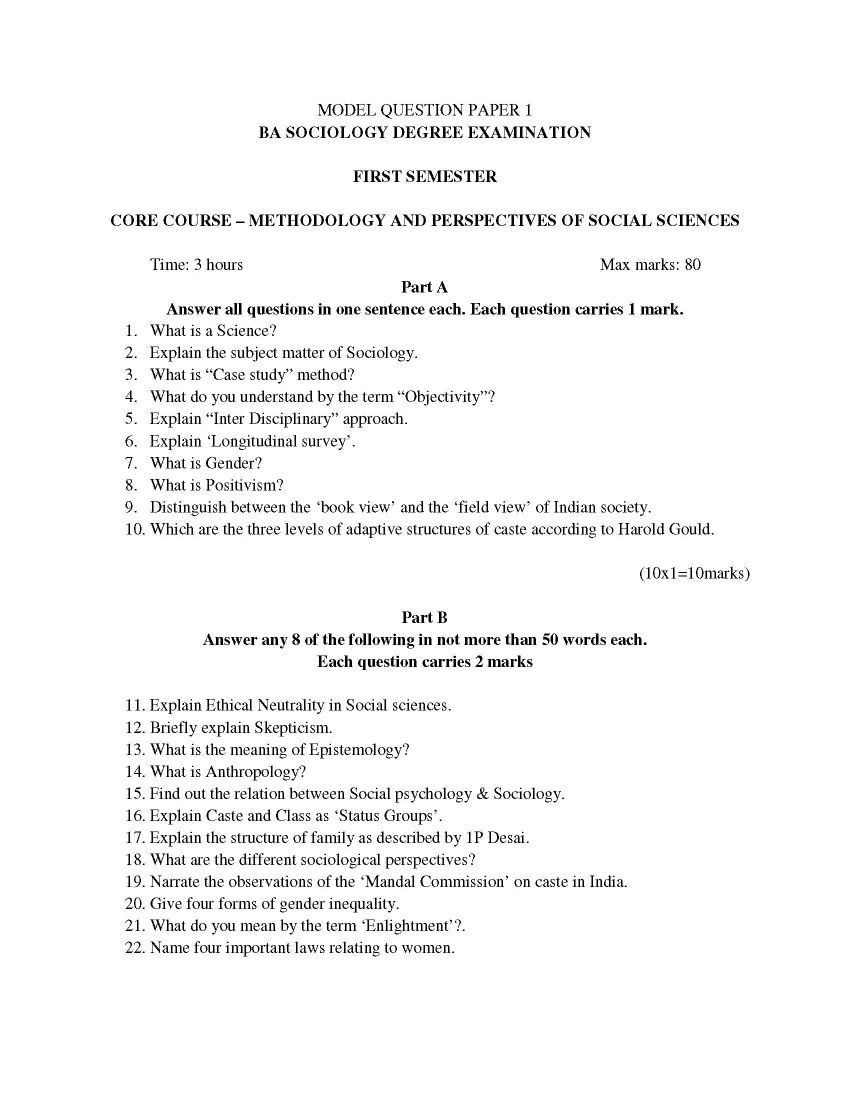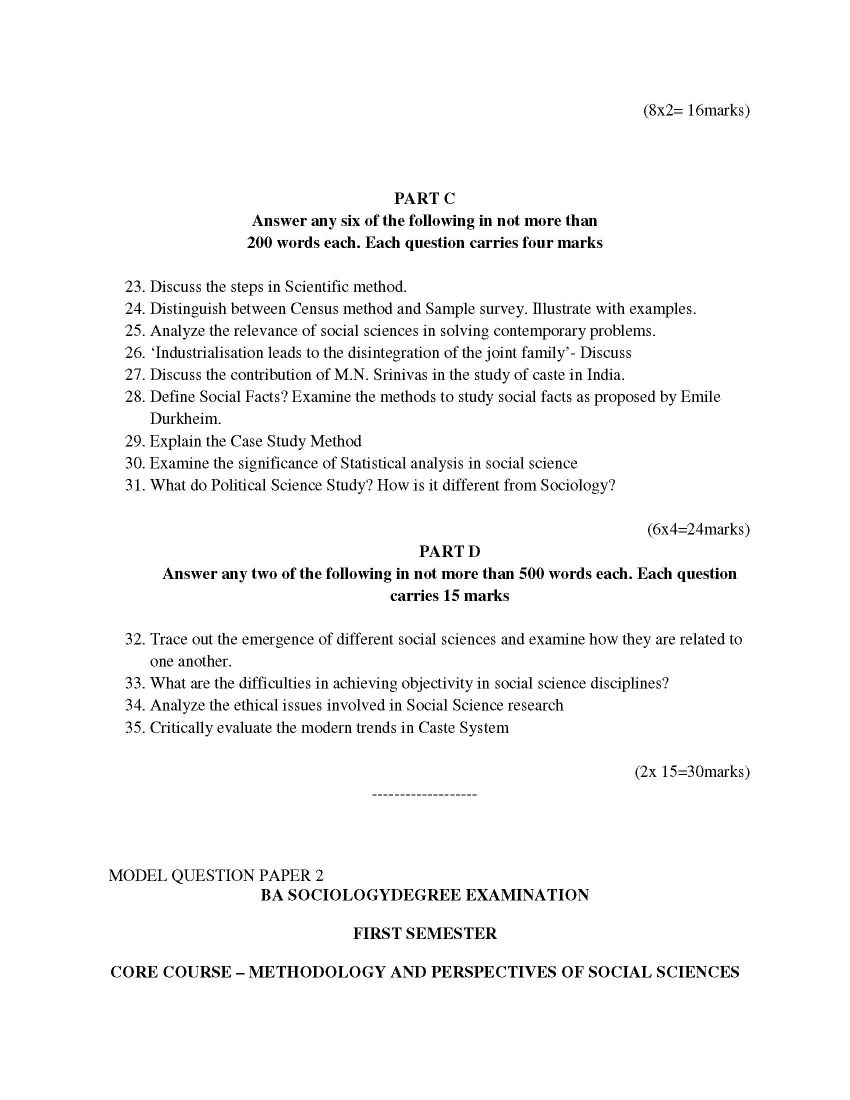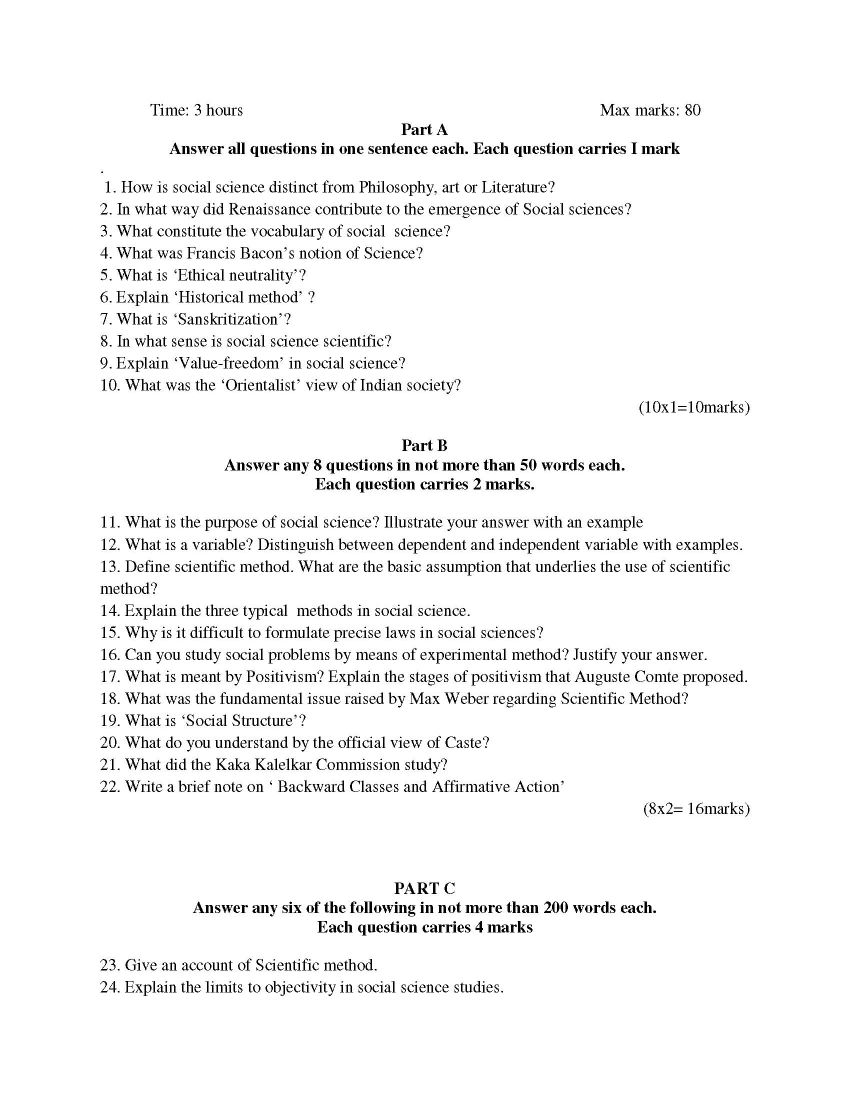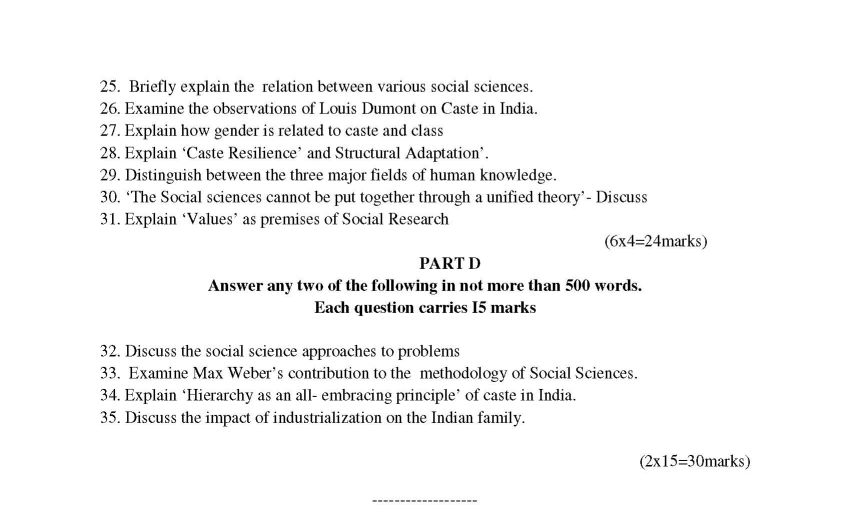| Re: Mahatma Gandhi University B.A Sociology First Year Exam Question Paper
The syllabus of B.A. Sociology First Year Programme offered by MGU (Mahatma Gandhi University), Kottayam on which the question paper is based is as follows:
SEMESTER I
PAPER-1 METHODOLOGY AND PERSPECTIVES OF SOCIAL SCIENCE
Course Code: SO1CRT01
Core Course
No. of credits: 4
No. of contact hours: 108
Objectives of the course
Identify the main concerns of social science disciplines
Articulate the basic terminology and theories prevalent across disciplines
Understand qualitative and quantitative models within the social sciences
To familiarise the methods and theories of social science to contemporary issues.
Critically read popular and periodical literature from a social science perspective.
Course Content
Module-I Introduction to Social Sciences
1.1 Social Science its emergence, historical foundation
1.2 Difference between Social science, natural science & humanities. Distinguishing features
of Social science
1.3 Relationship between Social sciences
1.4 Relevance of social sciences to understand and solving contemporary social problems at
Local, regional, national and global levels.
Module II Knowledge Production in Social Sciences
2.1 The sociology of knowledge-Karl Mannheim
2.2 Views about the nature of Knowledge-Positivistic and interpretative approach, Critical
and Feminist approach
2.3 Inter-disciplinary approach in Social science. (26 hours)
Module III Objectivity in Social Sciences
3.1 Objectivity Vs Subjectivity
3.2 Early attempts to establish objectivity in Social sciences-Comte, Durkheim and Weber.
3.3 Sources of Subjectivity.
3.4 Limits to objectivity in Social Sciences
3.5 Ethical issues in generating Social Sciences Knowledge
3.6 Sources of ethical issues Common Ethical concepts: Informed consent, Confidentiality
and anonymity, Pre-publication access (28 hours)
Module IV Social structures: Stories from the field
4.1 Caste-Class-Community in Indian Society: M.N.Sreenivas Coorg studies
4.2 Family and Gender: J.Devika -Making of Malayalee women (24 hours)
REFERENCES
1. Kundu,Abhijit The Social science: Methodology and Perspectives,- Pearson
Education,2009
2. Hunt, Elgin F, -Social Science and its Methods-, in Social Science an Introducti9on to
the Study of Society, Allyn and Bacon, 2008.
3. Perry, John, -Through the Lens of Science-, in contemporary society: an Introduction to
Social Science, Allyn and Bacon, 2009.
4. Porta, Donatella della and Michael Keating, Approaches and Methodologies in the Social
Sciences: A pluralistic perspective, Cambridge university press, Delhi, 2008, pp. 1938.
5. Natraj, V.K, et.al, -Social Science: Dialogue for Revival-, Economic and Political
weekly, August 18, 2001, pp 3128-3133.
6. Weber, Max, -Objectivity in Social Science and Social Policy-, in Mark J Smith (ed),
Philosophy and Methodology of Social Sciences, Vol. II, Sage publications, New Delhi.
2005, pp 3-49
7. Nagel, Ernest, -Problems of Concept and Theory Formation in the Social Sciences-, ibid,
pp 301-319.
8. Gulati, Leela, -Small is Beautiful: Case study as a method in Social Science-, in Sujatha
patel et. al (ed), Thinking Social Science- in India, Sage publications, New Delhi, 2002.
9. Zwart, Frank de. -The Logic of Affirmative Action: Caste, Classic and Quotas in India-,
in Acta Sociologica, Vol. 43, No.3, 2000, pp 235-249.
10. Badal, Sangeetha Bharadwaj, Gender, Social Structure and Empowerment: Status Report
of Women in India, Rawat Publications, New Delhi, 2009.
11. Shah, A.M, The Family in India: Critical Essays, Orient Blackswan, 1998, pp. 14-80.
12. Srinivas, M.N, -Castes: Can they exists in the India of Tomorrow-, in Caste in India:
And other essays, Asia Publishing House, 1962.
13. Srinivas, M.N,- Religion and Society among the Coorgs in South Asia -OUP,2003
14. Devika,J -Her-Self :Gender and Early writings of Malayalee Women-, Popular
Prakashan,2005
15. Devika,J, -Kulasthrreeyum Chandappennum Undayathengane?- CDS,
Thiruvananthapuram, 2010
SEMESTER II
PAPER -2 FOUNDATIONS OF SOCIOLOGY
Course Code: SO2CRT02
Core Course
No. of credits: 5
No. of contact hours: 108
Objectives of the Course
1. Provide preliminary understanding on the origin and development of Sociology as a
systematic discipline
2. Impart the learners a basic understanding of social life
3. Familiarize the learners with the role of various social institutions
4. Provide an understanding of the mechanism of social control and its importance
Module I Emergence of Sociology
1.1 intellectual and historical roots of Sociology
1.2. Pioneers of sociology (very brief reference)
1.3. Nature, subject matter and scope of Sociology Significance of Sociology
1.4 Origin and Development of Sociology in India (26 hours)
Module II Basic Terminologies in Sociology
2.1 Sociological Imagination, sociological consciousness, common sense and sociology
2.2 Society-types of society
2.3. Social change-micro and macro sociology. Social institutions-Family, Economic, Political and Educational. Micro and macro sociology
Module III Micro Level foundation of Sociology
3.1 Socialization-Types, Agencies, Theories, concept of self
3.2. Social interaction-Meaning, Types
3.3 Social Control and Deviance and crime. (28 hours)
Module IV Macro level foundation of sociology
4.1. Culture-significance, elements
4.2 Social Structure Definition, Elements, Functions
4.3. Social Groups-Types, primary, secondary, in groups and outgroups, reference group
(26 hours)
REFERENCES
1. Giddens Antony- Sociology-Polity Press, New York, 2006.
2. Alex Thio- Sociology: A Brief Introduction-Allyon and Bacon, 2000
3. Abraham, Francis and Morgan Henry John, 2010, Sociological Thought, MacMillan
Publishers India Ltd.
4. Abraham, Francis, 2006, Contemporary Sociology, Oxford University Press.
5. Abercrombie, Nicholas (2004) Sociology, Cambridge Polity Press
6. Bottomore, Tom 1986, Sociology: A Guide to Problems and Literature, Blackie and Son India
(Ltd)
7. Perry, John and Perry, Erna, 2010, Contemporary Society, Dorling Kindersley India Pvt. Ltd
8. Beteille, Andre (2002) Sociology, New Delhi, Oxford University Press
9. Bottomore, Tom and Robert, Nisbet, 1978, A History of Sociological analysis, Heineman.
10. Haralambos M and Herald R.M., 2008, Sociology-Themes and Perspectives, Oxford
University Press.
11. Horton, Paul and Hunt, Chester, L, 1980, Sociology, McGraw Hill
12 Yogesh Atal, Sociology: Study of the Social Sphere, Pearson India Educational Services
Pvt. Ltd, Delhi, 2015
13. David B Brinkerhoff and Lynn K White, Sociology, West Publishing Company,1991
14. David M Newman, Sociology, Exploring the Architecture of Everyday Life, Dine Forge
Press, New Delhi, 1995
15. Graham E White, Socialization
16. Henry Tischler, Introduction to Sociology, Wadsworth Cengage Learning, 2011
17. Johnson, Harry M., 1960, Sociology; A Systematic Introduction, Harcourt Brace, New
18. Kendall, Diana, 2007, Sociology in our times, Thomson Learning Inc., London.
19. Macionis John, 2006, Sociology, Pearson Education
20. R M Mac Iver and C H Page, Society, An Introductory Analysis, Mac Millian India Ltd, New
Delhi, 2006.
|



